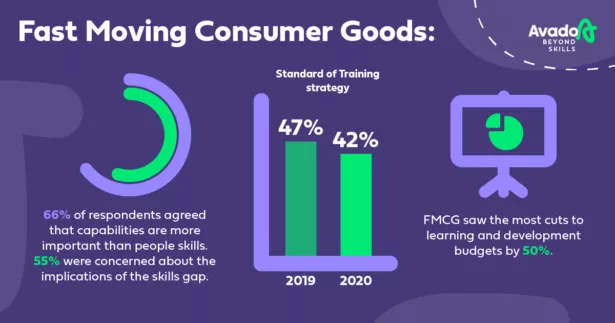HR training, delivered seamlessly online for busy professionals
Last month, we launched our Beyond Skills report. We surveyed more than 1,000 executives and senior leaders across several sectors, and we assessed the growing capability chasm. We found this chasm was identified by 60% of respondents as a real problem in their organisation. But what is a capability chasm? It’s the critical imbalance between the capabilities people have and the ones they need.
A lot of businesses have changed since 2020. In light of that, we mapped how that chasm compares to the changing attitudes around learning and development. We found that developing peoples’ capabilities is essential to business success. Across the board, 71% of businesses that saw growth last year did increase their training budgets, despite the fact that each sector has its own unique challenges.
But what can you learn about the capabilities chasm in the fast-moving consumer goods (FMCG) industry? Read on to find out.
What the Beyond Skills report highlighted for the fast-moving consumer goods industry
FMCG is a complicated and diverse industry that was hugely impacted by restrictions through 2020. According to our Beyond Skills report, FMCG businesses spent the last year prioritising survival over investment in their people. As well, given the challenges this sector faced, FMCG reported the second-highest rate of profit decline and the most cuts to learning and development budgets. Our research also highlighted a significant capabilities gap that needs to be addressed.
With all industries, FMCG included, it’s essential for companies to transition away from this ‘survival shift.’ Instead, they should look ahead to a less emergency-focused future to keep that capability chasm from widening any further.
Sixty-six percent of the FMCG people we surveyed agreed that capabilities are more important than people skills, and 55% were concerned about the implications a lack of capabilities could have. This sector also saw the most cuts to learning and development budgets, and nearly three-quarters (67%) felt learning and development wasn’t taken seriously in the boardroom.

How does fast-moving consumer goods differ from other industries?
The other four industries we surveyed had both similar and different opinions surrounding the capabilities chasm.
- Financial services respondents were the most likely to report a prioritisation of survival over capability at 68%.
- Tech and telco highly value digital transformation and learning and development, with 52% of respondents in this sector reporting increased investments in training.
- Pharma was just ahead of FMCG in terms of growth at 42% – FMCG reported 40%.
- Government and public services had to adapt quickly and faced more red tape than the other sectors. When it came to wishing for more investment in skill development, they reported the highest numbers at almost three quarters.
What should you do next?
As we’ve said above, the FMCG industry is complicated and vast. Because of that, we know that not every business was affected by the challenges of 2020 in the same way. For example, categories related to the home likely experienced growth, while more wholesale-focused organisations whose buyers were offices, restaurants, and leisure-based, might have struggled.
The past year has remarkably changed what people consume and how they consume it. That has driven a lot of the change we’ve seen in the industry. For those organisations that have struggled, they need to adapt to those shifting habits. Moving to more audience-focused solutions like direct-to-consumer or subscription models could be the answer.
That ability to pivot goes hand-in-hand with developing people’s skills and helping them adjust their mindsets. Understanding the customer is key. Identifying digital marketing capabilities and being data-driven in your thinking will help you adapt faster. That’s where the investment in quality training comes in. As the industry recovers from a challenging year, more learning and development investments will ensure a workforce that’s ready for the future.
About Avado
At Avado, we believe that true transformation isn’t digital, it’s human. We build professional future skills to help diverse talent access and accelerate careers through award-winning learning experiences that deliver tangible and measurable impact. We upskill people, uplift culture and future-proof organisations in a fast-moving world.
Avado is proud to be a people-transformation partner to some of the largest and most innovative organisations in the UK including: Google, BT, NHS, British Airways, UK Civil Service, Legal & General and AstraZeneca.
To find out more, visit www.avadolearning.com
 4 min read
4 min read 



